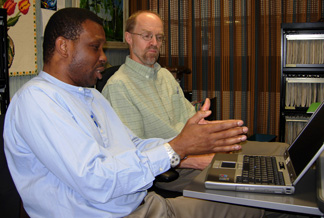 |
Jonathan Vennerstrom, Ph.D., talks about schistosomiasis project with Solomon Nwaka, Ph.D., Manager, Genomics and Discovery Research, World Health Organization (WHO). |
The UNMC College of Pharmacy professor is heading a $75,000 grant to investigate a new drug treatment for schistosomiasis, also known as bilharzia, a disease caused by a parasitic worm that strikes many in Africa, Asia, the Middle East, South America and the Caribbean. The project involves researchers in the United States, Switzerland and China. If left untreated, chronic infections can cause disease in the liver, intestinal tract, bladder (including bladder cancer), kidneys, or lung.
The objective of the grant, which is funded by the World Health Organization (WHO), is to develop a more effective single-dose drug treatment.
UNMC researchers are collaborating with researchers at the Swiss Tropical Institute and Chinese Institute for Parasitic Disease. “We are fortunate to have some colleagues working with us who are experts in this area,” said Dr. Vennerstrom, principal investigator of the grant. He and post-doctoral fellow Julia Poplavskaya, are working on the project at UNMC.
According to the World Health Organization, there are no vaccines for the disease, and existing drugs are often not readily available and have drawbacks including toxicity, high cost, and loss of efficacy due to drug resistance. New drugs need to be developed now, experts say.
Although schistosomiasis isn’t found in the United States, 200 million people are infected worldwide. The parasite lives in snails that exist in contaminated water. The parasite that causes the disease can penetrate skin, and within several weeks, develops into worms that grow inside blood vessels in the body and produce eggs.
Dr. Vennerstrom said he and his team are working to identify a new antischistosomal compound that can effectively treat the parasite. “We are gathering preliminary data and are testing compounds in animal models. “We have a ways to go . this is just the beginning. We are looking for more funding to do toxicity tests and get a drug company to partner with us.”
Researchers say if the compound works like they hope it will, the antischistosomal compound would be superior to praziquantel, which has no effect on immature worms. The drug also would reduce the risk of resistance development.
Solomon Nwaka, Ph.D., manager, Genomics and Discovery Research, WHO, recently met with Dr. Vennerstrom in Omaha about his project. Dr. Nwaka was working for Medicines for Malaria Venture (MMV) when he first became familiar with Dr. Vennerstrom’s work.
“It turns out Jonathan’s series of compounds not only has activity against malaria, but other tropical diseases.New drugs are desperately needed now and in the foreseeable future. The discovery of new compounds that have the potential to be developed into drugs is crucial,” Dr. Nwaka said.
He said one of the missions of the WHO is to help move drug candidates from discovery to development by identifying funding partners in the pharmaceutical industry. “The drug discovery and development industry is changing. We are in a very, very good situation today and it takes continuous momentum. On average, it takes 10 to 15 years to discover and develop a drug,” he said.